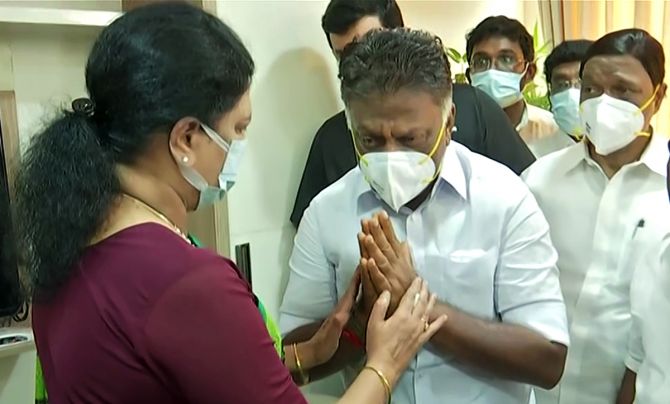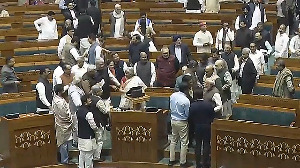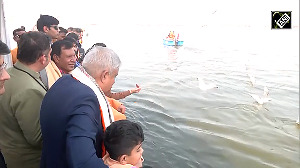The revived factionalism in the AIADMK, if not curbed now, has the potential to split the party vertically, warns N Sathiya Moorthy.

At a time when the ruling Dravida Munnetra Kazhagam's honeymoon with the Tamil Nadu voter should be ending even if on a bitter-sweet note without souring, the Opposition All India Anna DMK is yet to put its house in order after losing the state assembly polls six months ago.
Factionalism at the top continues to be the bane, with neither ideology nor political principles causing the internal division.
The former was the case when the parent DMK was formed out of 'Periyar' E V Ramaswamy's Dravida Kazhagan in 1949. The latter was the justification for actor-politician M G Ramachandran to break away from the DMK under then chief minister M Karunanidhi in 1972.
Today, in the golden jubilee year and month of the party's founding, personal egos between the top two, and this time over what both agree is a non-party person, has become the millstone.
The current tit-for-tat statements from the two factions centre around the call of Sasikala Natarajan, acknowledged as the last general secretary of the party by both, for them to unite, to try and regain the lost glory.
Confidante of the late charismatic and equally authoritarian chief minister J Jayalalithaa, Sasikala revived the unresponsive call from the past, after paying homage at the memorials of MGR and Jayalalithaa, on the AIADMK's golden jubilee.
By calling for unity of the kind, Sasikala has cleverly brought into the party discourse her own faceless group, after the official party had collectively ostracised her.
That was when she was serving a four-year jail-term in a case where Jayalalithaa escaped punishment, mostly because she was not alive by the time the Supreme Court confirmed the rest of the lower courts's verdict to the 't'.
Prompt to react, as always when it is Sasikala, was Leader of the Opposition Edappadi K Palaniswami, who owed his lost chief ministership to the lady. EPS faction leaders like former minister D Jayakumar, who lost his MLA seat in his native constituency in Chennai city, was prompt in resonating their master's voice.
Once the dust had settled down, or so it seemed, pat came the 'official view', if it was any, from party coordinator and three-time chief minister O Panneerselvam. Talking to newsmen in Madurai, he recalled how he had announced long ago that he along with EPS, as joint coordinator, would discuss the issue with other senior leaders before deciding on l'affaire Sasikala.
In the pre-poll past, whenever OPS had expressed similar views, especially in the weeks closer to election day, the matter would have ended there. Not this time round.
Speaking obviously for the EPS faction as a whole, Jayakumar recalled how it was OPS who after being forced out of the chief minister's job not long after Jayalalitha's death had launched a 'dharma yudh' against Sasikala. He did not mention how EPS still owed his chief ministership to the lady.
The intention was only to embarrass OPS, as if he were a political rival.
The problem for the AIADMK still revolves around personality clashes between OPS and EPS, with regional and caste calculations thrown in for great effect. The assembly polls, as expected, witnessed the consolidation of the traditional party votes in EPS's western belt.
The AIADMK's traditional backers in the dominant Vellala-Gounder community, from which EPS was the first CM, had returned to the fold after teaching the party's BJP alliance leader ruling the Centre a fitting lesson in the Lok Sabha polls of 2019.
It was over price rise, job losses and investment climate in the industry/agriculture region, apart from issues of traditional political issues of 'secularism and 'social justice'.
Against this, OPS, who similarly was the first chief minister from the dominant Mukkulathore community, the AIADMK's strong base in the southern districts, now seems to have given up on his opposition to Sasikala.
Today, to take on the western lobby, which is the single largest grouping the 63-member AIADMK legislature party, even if from outside and also on the outside, OPS needs to consolidate the AIADMK's southern voters.
Sasikala's humiliation at the hands of the party leadership, after EPS became chief minister and which move OPS endorsed with his hurt silence, had led her politician-nephew, T T V Dinakaran, to launch the Amma Makkal Munnetra Kazhagam.
The new party polled a substantial 5.5 per cent vote share, all of it the AIADMK's in the 2019 Lok Sabha polls, but this got reduced to 2.5 per cent in the assembly elections this year.
The Dinakaran camp feels it could have increased their vote share to 10 per cent with possibly a few seats from the Mukkulathore constituencies if only Sasikala had not remained silent pre-poll.
Instead, she having received a heroine's welcome when she returned home to Chennai from the Bengaluru prison -- all put up by Dhinakaran and the AMMK -- distanced herself from the party, saying that she would decide on her future political course only after the elections.
Now, such groups are reportedly advising Sasikala to help them revive the AMMK between now and the 2024 Lok Sabha polls, through the upcoming urban local bodies polls for municipal councils and municipal corporations, and through strong campaigning in between, if only to make the parent party sit up and take notice.
Some of them also visualise the possibility of the AIADMK, including the EPS faction, having to come to them for a future alliance, and possibly merger, if Sasikala led them and put her act from the past, together.
If Jaya is still 'Amma' to all AIADMK cadres, Sasi remains 'Chinna Amma' only to this section of party cadres. They attribute the community's increasing clout in AIADMK affairs, even more than in the MGR past, only after Sasikala and her late husband M Natarajan became Jaya's political aides.
For the tradition-bound community, OPS distancing himself from Sasikala was tantamount to backstabbing, which was/is not on. That included his dharma yudh against Sasikala and Co, as they felt that in the hours after Jaya's death, OPS owed his chief ministerial elevation for a third time in two decades only to the lady.
Getting a feel of the local mood, OPS had begun modifying his stance on Sasikala to levels now expressed by him, even ahead of the assembly polls. It was too little, too late.
To him post-poll, taming EPS has become an uphill task, especially after the latter deprived him of the Leader of the Opposition job, using past favours to party MLAs, which included funding their campaigns, to his benefit.
Today, EPS needs the party to be somewhere, but OPS needs the party even more. OPS also needs Sasikala, to shore up his chances for the future.
Sasikala, learning from MGR and Jayalalithaa's political past, seems to have concluded that she too needs the party as her virtual retirement after coming out of Bengaluru prison is not an option.
Her camp feels that the ruling BJP at the Centre is still after her, digging up past tax cases and the like. They are equally sure that EPS were to return to power, he would go after her more vehemently than even the ruling DMK at present.
Incidentally, the DMK state government, as if living up to the poll promise, has begun going after AIADMK ministers from the past, for alleged corruption and for amassing 'wealth disproportionate to their known sources of income'.
After protesting too loudly at the first raid of the kind, the party has got the political message since. It is now trying to play down such raids by TN state investigators, who have begun knocking at the doors of those closely identified with EPS from his days as CM.
Even otherwise, outside the legislature party, neither EPS nor OPS is sure about the loyalty of AIADMK cadres and their second-line leaders from other regions in the state, including the northern districts, with capital Chennai in focus.
The party lost heavily in these regions just as the DMK drew a blank in Coimbatore and Dharmapuri districts in the West. But for hoping to return to power, even a unified AIADMK cannot ignore these other regions.
The revived factionalism in the AIADMK, if not curbed now, has the potential to split the party, vertically.
In the worst case scenario the party could split along the existing West-South faultlines, with the North, where the AIADMK fared poorly in the assembly polls, holding the balance.
If nothing else, OPS, who had thought that he as the elected coordinator would have greater say if the party lost the assembly polls, finds himself stumped in every which way.
There are very few veterans in the party with enough clout and/or cadre sympathy, to be able to mend the affairs before they reach a point of no-return.
It is another matter that even when the party was born, the veterans who were present in abundant numbers could do little to dissuade MGR and M Karunanidhi to cool down and soften their ways.
The irony is that the current eruption in the AIADMK coincides with early media reports of alleged irregularities involving the ruling DMK and its ministers.
Chief Minister Stalin had to intervene when the eternally vigilant Tamil pulp press reported that Transport Minister Raja Kannappan had fixed a Rs 100 crore turnover as the qualification norm for firms desirous of making bulk supply of Diwali sweets for transport staff across the state.
The reports argued that there were very few firms in the state that could have recorded that kind of turnover in the state's dairy industry -- and possibly the minister had 'someone in mind'.
Stalin saved the day for the government and his prevailing public image by ordering that the Diwali sweets for transport staff should be procured only from the state government-owned Aavin.
Another more imaginative controversy involves superstar Rajinikanth's Diwali offering, Annaatthe. Produced by Sun Pictures, owned by Kalanidhi Maran, a nephew of Stalin and brother of DMK Ml Dayanidhi Maran, the film has Red Giant Movies owned by the chief minister's son Udayanidhi as distributors.
The Opposition, the pulp media and social media all have claimed that the government's decision this week to allow 100 per cent occupancy in cinema halls, post-pandemic, owes to the latter combo than to open up the film industry or facilitate entertainment for a larger section of the population.
There are also reports of arm-twisting of cinema hall owners in more ways than one. Whatever the truth of such allegations, sympathisers point out, how reports like this one, pertaining to the Sun TV group's alleged high-handedness, going down to the level of the last cable operator, had contributed to the DMK's downslide during Karunanidhi's last two terms as chief minister (1996-2001 and 2006-2011).
All is not lost for the DMK yet as there is still a groundswell of sympathy, not all of them outright support, for Stalin -- as a Dravidian leader seen as wanting to do some good and something different.
Yet, Stalin needs a lot more time to be identified as the 21st century Kamaraj or MGR in state politics, but those around him do not seem wanting to give him that time. So do a section of second-line leaders and third and fourth-line cadres.
At least two MPs belonging to the DMK are involved in criminal cases, one of them being successively denied bail by courts in a murder case. There are cadres and cadres who seem to have forgotten the existence of social media, or do not seem to acknowledge the power of the same as yet, with the result, their wrong-doings in restaurants and other public places have begun reaching individual homes, individual voters, on their mobiles.
As party leader and chief minister, Stalin too is finding not enough time to discipline the cadres despite his good intentions. He cannot entrust the job to other seniors in the party, as according to reports and their own personal past, many of them are either involved in wrongdoing or are known to cover-up the wrongs of third and fourth-line cadres and lower-level office-bearers, for their own constituency reasons.
It is at a time like this that the AIADMK has revived its factionalism, which is all about ego clashes between the Big Two, who really are not that big.
The urban civic body polls, due early next year, is another problem for the party, as it cannot hope to register big victories even if united at all levels.
The AIADMK did not fare well in the assembly polls especially in urban centres across the state. It needs to retrieve at least some of the lost image in urban elections if it has to have a functional grassroots-level organisation for the Lok Sabha polls, due by May 2024.
Even otherwise, the AIADMK seems to be unprepared for absorbing and benefitting from events and developments around it.
By inducting his son Durai Vaiyapuri as party headquarters secretary, MDMK's Vaiko has turned his past criticism of mentor Karunanidhi in the parent DMK, on its head. This has caused ripples within the party, which was never a great contender for the throne and has dwindled drastically through nearly three decades of existence.
Likewise, having provoked the most saleable Tamil actor, Vijay, when Jaya was chief minister, the AIADMK does not seem to have any clue when some of his fans contested and won panchayat seats in last month's nine-district polls -- even if as independents. It was after Vijay had moved the Madras high court against his parents for converting his fans organisation as a political party registered with the Election Commission.
Vijay's father S A Chandrasekharan was a successful film-maker in his time. National viewers will remember him for the Amitabh Bachchan-Rajinikanth starrer Andhaa Kanoon (1981).
More recently, SAC acted the role of late 'Traffic' Ramaswamy, a popular activist who sent out the message that the common man could get justice through legal means, by approaching the higher judiciary.
The film bombed, but it also exposed SAC's personal ambitions, going beyond his attempts to protect his son from the punctuated 'anti-Christian' social campaigns of the Hindutva brigade.
Unlike superstar Rajinikanth, the current winner of the prestigious Dadasaheb Phalke Award for film personalities, Vijay does not want to get caught in the cinematic political web of his own making.
By beginning with loaded one-liners, and talking politics off-screen, Rajini ended up stirring up fan-hopes for his direct political entry for close to a quarter century, before calling quits in the face of the Covid pandemic after declaring his intention to float a political party and contest this year's assembly polls on his own.
Vijay aides seem to think that he could mouth political one-liners for the sake of revving up a scene or his own image on-screen, but cannot afford to send out confusing signals off-screen.
In particular, over-politicisation of commercial cinema, especially if the actor had no intention of entering politics could lead to his films bombing at the box-office as his own fans and ordinary film-goers cannot but draw a mental parallel with Rajini's promises from the past.
Sadly for the AIADMK, the party has no plans to induct a crop of future-generation youth who are politically tuned but do not have a forum to call their own -- youth, like Vijay's younger-generation fans who are politically alive and are electorally ambitious.
The implication, of course, is that by tradition, youthful voters willing to act independently are more likely to be anti-government, where they are not anti-Establishment.
N Sathiya Moorthy, veteran journalist, political analyst and author, is Distinguished Fellow and Head-Chennai Initiative, Observer Research Foundation.











 © 2025
© 2025